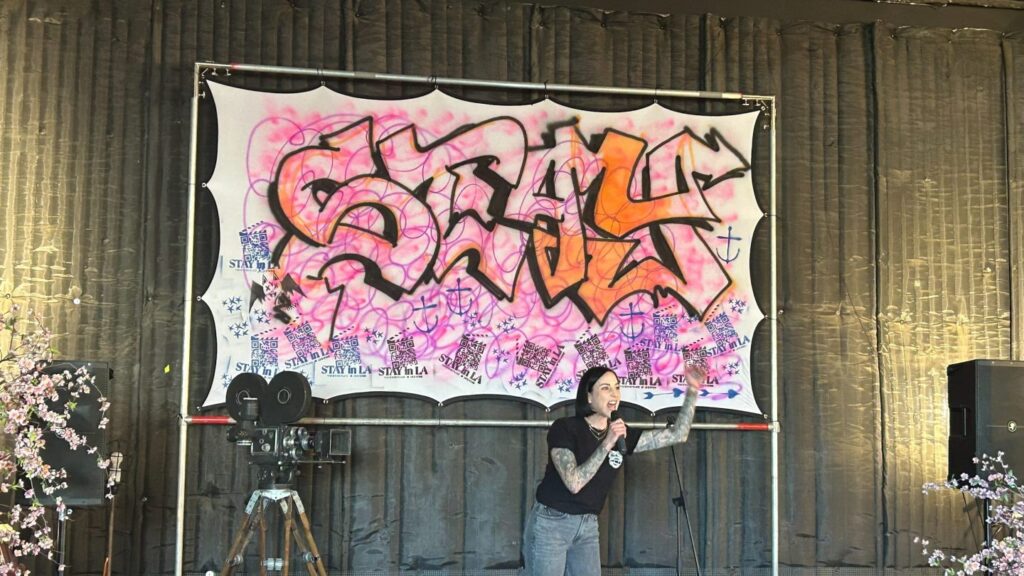As Hollywood’s employment crisis deepens with no relief in sight, more than one thousand rallied on Sunday in support of amplified incentives intended to convince more film and TV productions to stay in Southern California.
At the “Stay in L.A.” event at a studio services complex in Sun Valley, politicians shared stories of constituents in dire circumstances, industry professionals detailed parenting struggles stemming from working in other jurisdictions, and a labor leader described receiving calls every day from desperate union members as production work has dried up in Southern California in the last few years.
More than 25 speakers, from policymakers to union officers to workaday performers, painted the picture of an unlevel tax incentives playing field that is jeopardizing the livelihoods of working-class and middle-class creatives and crew members who may not front a film or show but are crucial to their creation.
The goal: to emphasize a pressing need for California legislators to greenlight Gov. Gavin Newsom’s budget proposal, which would more than double the state’s ceiling for its film and television production incentives program, from $330 million to $750 million a year. Also on the table: legislation to increase the film and television credit to 35 percent and expand eligibility to include animation, large-scale competition shows and shorter television series.
“This is Hollywood, California. We have to stay competitive to stay alive, to keep our industry alive, to keep tourism alive, to keep the entire ecosystem alive,” SAG-AFTRA secretary-treasurer Joely Fisher said in an animated speech that echoed through Sir Reel Studios, which hosted the event. “Make Hollywood Hollywood again!”
The Stay in L.A. movement, which rose from the ashes of the Pacific Palisades and Altadena fires in January with the stated purpose of advocating for an influx of film and television work as a means of recovery, helped organize Sunday’s event. The movement’s leaders have advocated not only for legislation but also for commitments from major studios streamers to keep more of their sets in L.A.; so far, no major company has publicly responded to the call.
Speakers emphasized that the entertainment industry isn’t just comprised of stars at the top of the call sheet but also grips, costumers and drivers, among other crew workers. “These are the very people who have built California’s reputation as the entertainment capital of the world,” said DeJon Ellis Jr., the business manager for the IATSE Local that bargains on behalf of grips, craft services and warehouse workers. “The truth is, we are not just creating entertainment, we are creating jobs, we are sustaining families, we are shaping the identity of California itself.”
And rally headliners argued that productions sustains many small businesses like History for Hire, a prop house in North Hollywood whose president, Pam Elyea, exhorted attendees to stop by because business wasn’t booming: “We’re lonely,” she said. In her speech, Lindsay Dougherty, the leader of the Hollywood Teamsters, compared Hollywood to her hometown of Detroit before the auto manufacturers went into crisis.
The display of persistence and, at some points, frustration, all played out in Sun Valley against a backdrop of a post-Peak TV era when studios are cutting costs and Hollywood’s output has shrunk.
Though many industry workers survived momentary shutdowns during the COVID-19 pandemic and the duel strikes in 2023, work never roared back. According to the latest report from FilmLA, on-location production in 2024 was the lowest it’s ever been recorded by the film office beyond 2020, when projects were shut down due to the COVID-19 pandemic. Soundstage occupancy was also down in 2024, to 63 percent, compared with 93.5 percent between 2016 to 2022.
The California legislators’ proposals may provide some form of remedy. Still, the proposed legislation isn’t a done deal. Two speakers at Sunday’s event suggested that politicians from Northern California, where the entertainment industry does not have the same presence, may be a holdup. And the Motion Picture Association, the major lobbying group for studios and streamers, and entertainment unions are also still negotiating the specifics of potential legislation.
“I think educating the Northern California electeds is always a hurdle just because they don’t see how much this industry impacts the state of California,” Dougherty said in an interview with THR at the event. “But I think that [with] the two bills, we’re going to have overwhelming support from the Assembly as well as the Senate. We’ve just got to make sure that we’re doing our due diligence to fully get the word out.”
Policymakers who seemed a little less optimistic about the ultimate fate of the bills and politicians’ general awareness of Hollywood’s plight called on the audience to inundate their representatives with messages. “I’ve got to tell you guys, you’ve got to do a little more to push people like myself,” Los Angeles City Councilmember Imelda Padilla said, pointing out that only four of L.A.’s 15 councilmembers were present for the event. “Pick up those phones, get those numbers and call every single councilmember to put this at the top of the list.”
Added Jessica Caloza, who co-authored the two tax incentive bills at play, “What I see in this room is energy that we feel we need to bring to Sacramento.” She added, “There’s a lot of people in this state who do not believe we need the film tax credit. And we need you all to turn out.”
The remark came after she led the crowd in a chant familiar to many in the entertainment labor space, where it is a staple of union rallies: “When we fight / we win.”
Read the full article here


